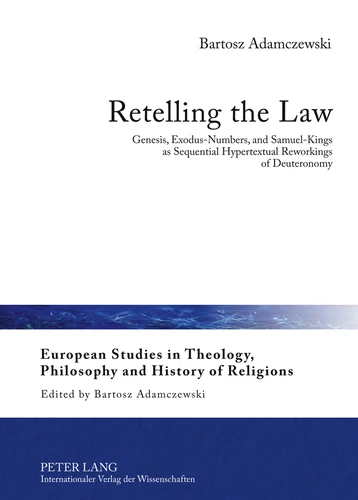Retelling the Law. Genesis, Exodus-Numbers, and Samuel-Kings as Sequential Hypertextual Reworkings of Deuteronomy
Par :Formats :
- Paiement en ligne :
- Livraison à domicile ou en point Mondial Relay indisponible
- Retrait Click and Collect en magasin gratuit
- Nombre de pages376
- ISBN978-3-631-63034-1
- EAN9783631630341
- Date de parution01/02/2012
- CollectionEuropean Studies in Theology,
- ÉditeurPeter Lang
Résumé
Using the method of critical intertextual research, this book demonstrates that Deuteronomy (written c. 500 BC) is an Israelite sequential hypertextual reworking of Ezekiel, that Genesis and Exodus-Numbers (written c. 400 BC) are Israelite sequential hypertextual reworkings of Deuteronomy, and that Samuel-Kings (written c. 300 BC) is a Judaean sequential hypertextual reworking of Deuteronomy. Consequently, the book disproves the theories of the existence of the so-called sources or traditions of the Pentateuch.
The recognition of the fact that the Pentateuch is an Israelite and not a Judaean work may have great consequences for the dialogue between the monotheistic civilizations in our world and for peace initiatives in the Holy Land.
The recognition of the fact that the Pentateuch is an Israelite and not a Judaean work may have great consequences for the dialogue between the monotheistic civilizations in our world and for peace initiatives in the Holy Land.
Using the method of critical intertextual research, this book demonstrates that Deuteronomy (written c. 500 BC) is an Israelite sequential hypertextual reworking of Ezekiel, that Genesis and Exodus-Numbers (written c. 400 BC) are Israelite sequential hypertextual reworkings of Deuteronomy, and that Samuel-Kings (written c. 300 BC) is a Judaean sequential hypertextual reworking of Deuteronomy. Consequently, the book disproves the theories of the existence of the so-called sources or traditions of the Pentateuch.
The recognition of the fact that the Pentateuch is an Israelite and not a Judaean work may have great consequences for the dialogue between the monotheistic civilizations in our world and for peace initiatives in the Holy Land.
The recognition of the fact that the Pentateuch is an Israelite and not a Judaean work may have great consequences for the dialogue between the monotheistic civilizations in our world and for peace initiatives in the Holy Land.








